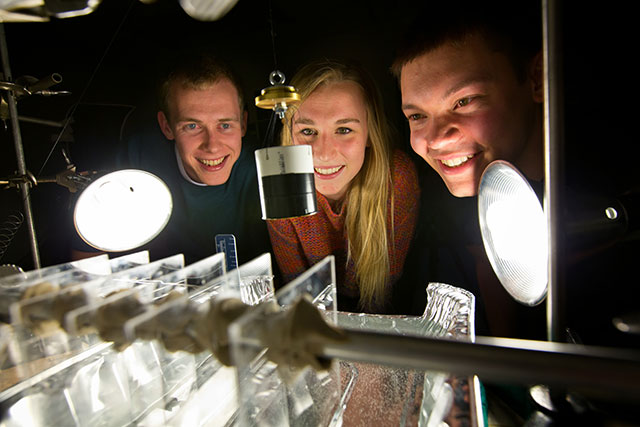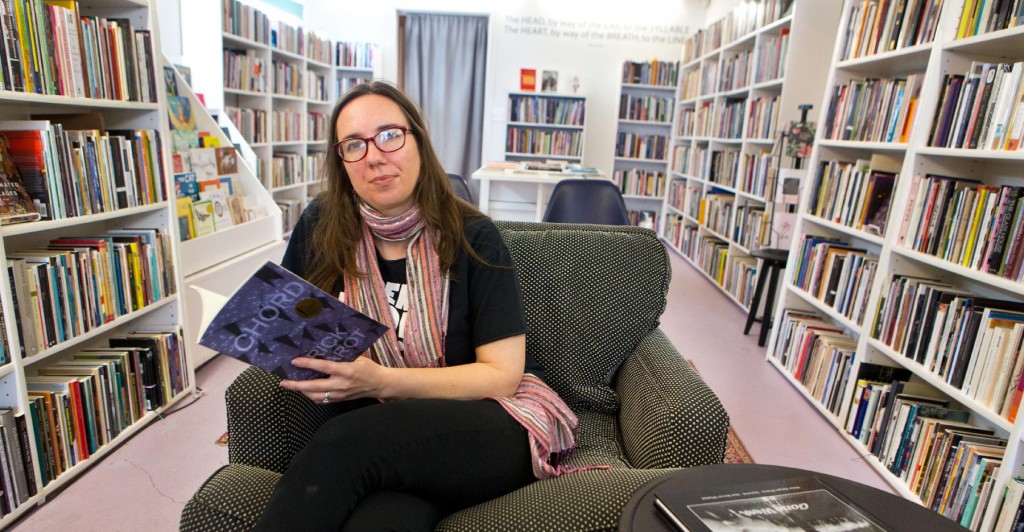Page 187 • (1,962 results in 0.116 seconds)
-
. During the process of the visualization, pitch and volume is extracted by Fast Fourier Transform (FFT), to produce a fractal animation using the fundamental frequency of a current audio sample of the input music. This combination of pitch and volume is used to render a specific Julia Set fractal belonging to the Mandelbrot Set, creating an intuitive and interesting audio visualizer for all to enjoy. 10:00am – PhysiCL Ben Warner (BA/3-2 Eng.) PhysiCL is a general-purpose Python physics simulation
-
Placement and RegistrationInstrumental AuditionsChoral AuditionsPlacement and Registration Music Ensemble Placement Auditions Fall 2024 Auditions August 31-September 4, 2024 Membership in a music ensemble is based on the results of ensemble placement auditions held in the Mary Baker Russell Music Center during move-in weekend and the first week of classes. The Audition Process Click on the INSTRUMENTAL or CHORAL audition tabs above and carefully read the information regarding auditions
-

Paula Leitz, associate professor of education. “Capstones at PLU engage students in focusing their total PLU education into a focused area. It is not just a culminating activity – it is an opportunity to rethink and refine one’s personal reflection on the result of four years of intellectual engagement at PLU,” Leitz said. “Faculty are a significant part of this process as they lend their expertise and provide individualized support to students.” Nevis Granum ’13 exhibits some of his photographs as
-
: Capstone: Senior Seminar I – SR Professional development, exploring career paths, case studies in ethics, literature review, experimental design, and the research process. With 499B meets the senior seminar/project requirement. Prerequisites: PHYS 223 with a C- or higher; two upper-division courses in physics, one of which may be taken concurrently with 499A. (1) PHYS 499B: Capstone: Senior Seminar II – SR Continuation of PHYS 499A with emphasis on design and implementation of a project under the
-

question: “Why did the writer cross the genre?” The writers discussed their experiences working across genres: the internal tension, the infusion of creativity, the challenges, the unexpected triumphs. Dozens of MFA students, hooked on every word, scribbled notes and intently listened. One attendee was overcome with emotion as she asked a question at the end, apparently grappling with insecurities within her own process. Swift says that’s not uncommon. “Everybody cries at some point,” she said. “You
-
the roman writing because he could not decipher the hieroglyphics. Rich relationship between writing and hieroglyphics has been forever lost. Dennis Tedlock, in his preface and introduction, talks about the process of translation and transcription. You can read more about Dennis Tedlock here. II. Structure of Popol vuh Book 1: Creation of the Earth, animals and attempts to create first humans Book 2: Stories of Seven Macaw, his family, and their defeat Book 3: Epic stories, of Hunahpu and
-
, adolescence, family relationships, illness, death, and much more in a way informed by an understanding of a wide range of human stories. Not just by aggregate data.” (Nussbaum, 26) Studying in the Humanities, then, means seeing the world authentically. It means trying to understand the richness of human experience, to trace its history, to value its variability. The humanities prompt us to ask who we are and how we came to be this way. They ask us to reflect, to understand, to see knowledge as a process
-
damaged DNA causes errors during transcription. This process can result in a population of mutant transcripts that could ultimately result in an altered cellular phenotype. The cell is equipped with mechanisms to combat such DNA damage. However, if the damage is not repaired before replication it can induce a permanent mutation in the cell’s genome, an event known as replicational mutagenesis. When this occurs the mutation is passed along to every subsequent daughter cell, thus completing the cycle of
-
aftermath, the perceived lessons of the Holocaust in the 1990s, and the process of collecting Holocaust oral history. Presenters: Thomas Foth, R.N., M.A.(Ed), Ph.D. Ms. Carli Snyder, Graduate Student Moderator: Christina Pepin, Chair, School of Nursing at PLU 11:45 a.m. - 1:35 p.m. – Mayer Summer Research Fellow Presentations (Room 133, AUC)Mayer Summer Research Fellows will offer brief overviews of their summer research projects as the conference participants enjoy box lunches. Introduction: Natalie
-
AccompanistsFor certain performances (juries, recitals) you will need the services of an accompanist. In all situations, please inform me of who you plan to use as an accompanist. Although the professionals charge, they are worth the money. A less skilled student or friend does not allow you to focus on your own music making and can make the process tedious. I urge you to contact accompanists early in the semester to make sure they will be available. You should plan to get the music to your accompanist at
Do you have any feedback for us? If so, feel free to use our Feedback Form.


